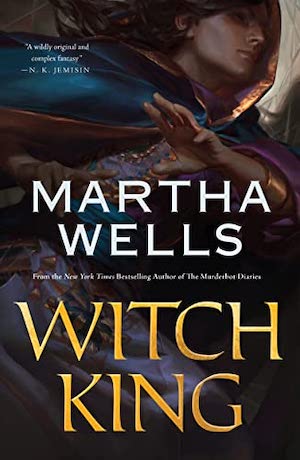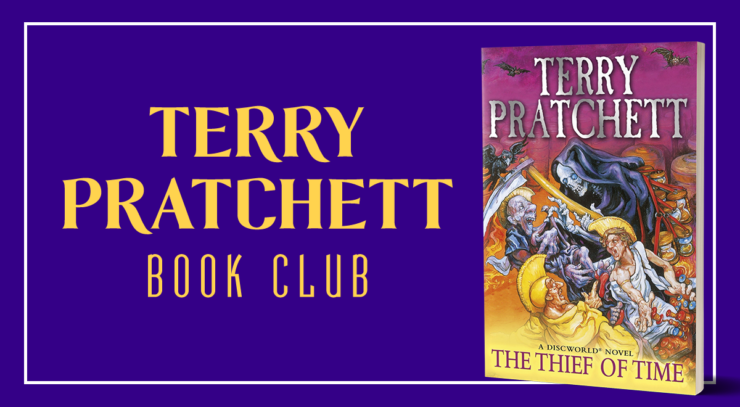Hickory dickory dock, the Death of Rats ran up the glass clock that stopped Time—or however that dang thing goes…
Summary
Susan and Lobsang are being tracked down by the Auditors in the museum, but come upon a set of signs designed to trap them (one says “Turn Left” but points right, and similar). Eventually a figure comes to their rescue, killing one of the Auditors by shoving a chocolate into its mouth—it’s Lady LeJean, and she takes them up to the attic. There are frozen people who generally live up there, and Lady LeJean is living up there too, and trying to hide and learn, knowing the Auditors have to be stopped. She tells them that Jeremy is just down the passage, and Susan explains that he exists outside time too; he’s Lobsang’s brother. It’s a lie, but Susan needs to make sure they’re safe before she sits Lobsang down and tells him what Nanny told her; they’re actually the same person born twice. She also tells him that his mother is Time. When Lobsang talks, Jeremy mouths the words in his sleep. Lobsang decides to touch Jeremy, everything whites out, and when they come to, Susan sees that both Lobsang and Jeremy are gone… but there’s ribbons of light following her and Lady LeJean, who head to the elevator to get out. The specter (memory) of Lobsang/Jeremy tells Susan to get to the clock, so she and Lady LeJean head off to arm themselves with more chocolate.
Buy the Book


Witch King
Lu-Tze discovers Ronnie true name as they ride through the city, while Susan and Lady LeJean invade the chocolate shop. Susan realizes that the Auditor’s name actually translates roughly to “innumerable legion” and suggests that she change her name to Unity to remind herself that she is one person. Lu-Tze tries to be encouraging to Ronnie, who is actually the personification of Chaos—that’s the name Soak spelled backwards, of course. But Ronnie doesn’t take well to the encouragement, so Lu-Tze goes for insults instead. Ronnie vanishes, leaving behind a group of Auditors who Lu-Tze tries to outwit, but certain Auditors are getting smarter and not falling for the usual tricks. Voices come up on the edge of his senses, and chocolates are thrown across the road, and Lu-Tze almost winds out of time but Susan winds him up again. Death tells the Auditors what is happening is wrong, and as he does this, another figure arrives: the angel clothed in all white of the Iron Book from the porches of Tobrun. Death has to inform him that he’s no longer official in church Dogma, and therefore should not be here. The other horseman arrive and they all notice that the Auditor is behaving like an individual. Death tells it that though they are supposed to ride out, it isn’t written against whom.
Kaos reorders himself around the current concept of chaos (which is basically chaos theory) and rides out. The chocolate-fighting group decides that they need to be unpredictable to distract the Auditors in the way of the clock, and both Unity and Lobsang know that Lu-Tze should be the center of that distraction because he’s going to die. The horsemen are having a hard time, and Death realizes that it’s because the Auditors are effecting how they think because they’re all a bit too human. He tells them to shore up against it, and that’s when Ronnie shows up to ride with them. Lu-Tze’s head is cut off, but he’s still alive because he’s tried the yeti trick. Lobsang takes Susan’s hand so she can make it toward the clock. When they finally arrive, Wen is there holding the Death of Rats, and Lobsang gets to meet his mother. Wen takes Susan aside to talk, and Susan notes her confusion that Lobsang built the clock and is now aiming to destroy it, effectively destroying and saving the world at once. Wen points out that it’s a family trait—this is what Time does. When the conversation is finished, Susan learns that Lobsang will become Time now. Lobsang breaks the glass clock and shatters history, sending them out into the world again.
They find Lu-Tze and Unity, and head to the History Monks’ valley, where the spinners are a mess. Susan realizes that once Lobsang fixes this, he will vanish afterward; he’s no longer human enough to exist as one. Lobsang gets the Procrastinator room running again and is gone. Susan and Unity leave, and Unity asks if Susan liked Lobsang as she had liked Jeremy. Susan doesn’t want to follow that track of conversation and says she’ll help Unity is there’s anything she needs—Unity says she wants hope dying. Lobsang shows up in Lu-Tze’s garden and asks if the fifth surprise of the garden is him. Lu-Tze says he will have to go to the Iron Dojo to fight him and find out. Lobsang finds out from the abbott that by agreeing to this only one of them may walk out. Lobsang asks that Lu-Tze tell him the fifth surprise and he will not harm him. Lu-Tze produces a goofy carnival mask, which he puts on—he never claimed the fifth surprise was any good. They fight, but Lu-Tze beats him; the only way Lobsang can win is by using his powers and turning the man to dust, which he won’t do. Lu-Tze declares that he’s earned his yellow robe, but he won’t take it: He wants the robe of a sweeper. Death and Chaos help Unity die by giving ing her chocolate, and Lobsang shows up in Susan’s classroom cupboard where she’s gone to sneak a chocolate for herself: Even with the nougat center, it’s a perfect moment.
Commentary
Sorry, I just:
IT IS BIG, AND YOU ARE SMALL, AND AROUND YOU THERE IS NOTHING BUT THE COLD OF SPACE, AND YOU ARE SO VERY ALONE.
The other three horsemen looked unsettled, nervous.
“That’s coming from them?” said War.
YES. IT IS THE FEAR AND HATRED THAT MATTER HAS FOR LIFE AND THEY ARE THE BEARERS OF THAT HATRED.
So whenever you feel too afraid at your own smallness against the universe’s vastness, that’s the Auditors talking, taking up space within you. Because they are afraid of life. This is a tool to help when you feel tiny and insignificant and scared. And he’s offering this lesson through Death because Death is basically the closest that Pratchett ever gets to the concept of a benevolent god. Death can make sense of the things that we feel too little to understand.
It’s fine, I’m fine.
I do, however, have one complaint, and it is a very me complaint: It’s lovely, but I don’t think that Lobsang and Susan are actually that… romantic as this beautiful little button on the story? On paper it sounds great—son of Time, granddaughter of Death, who is herself perhaps the personification of helpfulness—by it actually lacks that little twist I was hoping for… which Susan and Unity.
Unity who was innumerable, who was an Auditor, the thing that Susan hates. The two of them pining for the same man, and then realizing that there’s something else going on here. It’s a twofold problem for me, which is part that Pratchett doesn’t really showcase queerness very directly in most of what he’s writing, and also the fact that he tends to treat romance as an afterthought because he’s a pragmatic (and very very British) sort of mind. Susan is sensible because there’s a bit of Susan in him. But Susan was also spending this story looking for the person like her, and it’s so much more moving to me if the person she actually needs is not someone very like her at all.
And I get it, the idea of being in love with Time is just a very sexy thought in abstract, but he already did that in this book with Lobsang’s mother and Wen. Unity is something entirely new, and thematically jives in an entirely different way with Susan’s difficulty with regular people. She’s just the more interesting pick to my mind. And there’s also one of my favorite tropes in there to consider, being the fact that being a woman is entirely incidental to her—she just wound up with the body she had, and figuring out how to be a lady is baffling. Susan trying to help her is equally hilarious.
So it’s fascinating to me because on some levels this book just speaks directly into my brain on the right frequency, but then there’s other bits that feel so discordant, it knocks me off axis. Which is an interesting experience to have in reading, really. I’m not actually complaining about that part. It’s just weird to have certain halves philosophically jive and then scrape up wrong on the other side.
So this is the last Death book, and I’m going to miss having them centered, but this is a fascinating final chapter, as it were. Not that there are final chapters where he’s concerned. Obviously, we’ll be seeing him everywhere, all the time.
Asides and Little Thoughts
- There’s another bit like Death’s acknowledgement of feeling small and insignificant, which is Susan noting that Auditors get into our heads, and that you know it’s them when you find yourself thinking things like “there ought to be a law” and suchlike. Which is equally disturbing.
- Susan has realized that being sensible doesn’t make her right, and that’s growth, girl.
- Just don’t ask about salad cream, says the footnote. It’s right.
- I do love how the horsemen talk about Chaos like their fifth Beatle.
Pratchettisms
The woman looked at the world through panda eyes and her lipstick touched her mouth only by accident.
And this, Susan knew, was her mind telling itself a story.
There was only one survivor and, when Miss Tangerine ate the chocolate, there wasn’t even that.
Lu-Tze regarded the speaker. She looked like a society lady who had just had a really bad day in a threshing machine.
The world had run out of horizons.
In order to fear, you had to be a me. Don’t let anything happen to me. That was the song of fear.
It was a work of art, the sword. It had imaginary velocity, negative energy, and positive cold, cold so cold that it met heat coming the other way and took on something of its nature. Burning cold.
And, as she ran toward it, it moved away. The floor unrolled in front of her, dragging her back. The clock accelerated toward some distant event horizon. At the same time it grew bigger but became more insubstantial, as if the same amount of clockness was trying to spread itself across more space.
All right, this thing was one of them, it was merely wearing—well, at least, had started out merely wearing a body as a kind of coat, but now…after all, you could say that about everyone, couldn’t you?
Next week we start The Last Hero! Which is also, coincidentally, the last Rincewind novel. We’ll read up to:
I THINK WE SHALL HAVE TO CLEAR THE DECKS FOR THIS ONE, said Death










